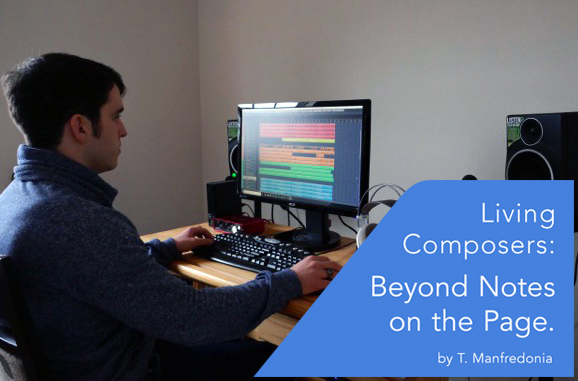During my latter years of attending Temple University for a degree in Music Composition, I came across the most applicable composer-driven podcast: The Portfolio Composer. At the time, it was called Composer on Fire. Prior to hearing the various interviews with renowned composers and performers, such as Reena Esmail and Jeffrey Biegel, I always thought (and dreamed) of making a living purely off of writing music. That glorious pipedream of,
“I’m going to graduate college, move to where the art is happening, and make a living off commissions to write music for ensembles both large and small! It can’t be that hard after I get my degree!”
The reality of living in the 21st century is that this scenario simply doesn’t happen frequently to the hundreds of thousands of composers on our planet. The Portfolio Composer Podcast, especially, opened the eyes and ears of many — myself included. We live in a time where multiple income streams is the name of the game for living composers.
Out of the 100+ interviews Garrett Hope had on his podcast, nearly all of them have expressed some level of multiple income streams (I’ll describe my own momentarily). In that case, what do multiple income streams look like for composers? Is there a “right” way to do it? Personally, I don’t believe so, which is why I’m going to share what my streams are, and why they’re but a few of countless options to create a living as a composer.
1.) Church Music Director
The reason I placed church music director first, not a composer, is because it’s the most consistent of my income. It’s the backbone for all my other work. I know when I’m getting paid, how much I’m getting paid, and can budget my expenses very strategically when my bi-weekly paycheck doesn’t change in the slightest. This salary allows me to write music with a free headspace — I’m not relying on the uncertainty that comes with commissioned music.
I cannot recommend a salaried or hourly job enough. What that looks like is entirely up to you. I even encourage looking outside the scope of music, especially if you have an additional passion. Ed Windels — a composer and orchestrator — is known as the advocate for “9 to 5” artists. (In other words, artists who also have a day job).
Given my religious background, being a church musician also fits the bill to who I am as an individual. Prior to having this position, however, I was working as an iPhone repair serviceman. While I much prefer being a music director, I still had something concrete, regular, and reliable for my first year out of schooling. Having a financial backbone is unbelievably beneficial for a sound mind!
2.) Elementary School Music Teacher
While not the easiest job in the world, teaching general music is part of my “music director package.” That was the deal: be the music director, and also teach at the school. The fact I majored in composition rather than education, adjusting to teaching general music to children has been a steep learning curve. But, why limit myself to strictly composing and playing music? By expanding my skillset to instruction of music, my portfolio lifestyle only grows. It opens a whole plethora of future opportunities — in other words, an increased value as a musician.
Plus, who’s to say I can’t write music for the children? Since I’ve been trained in composition, why not incorporate that knowledge in my classroom? Even if it’s a vastly different style than most of my output!
3.) Composing Music
The reason I put composing music as number three in this article is because of financial consistency. Receiving commissions, royalties, or any other form of income from composing will be partially inconsistent. Each project will have a slightly different budget. Maybe more scores sold last year than this year. Annually, composing provides different opportunities with different forms (and amount) of payment.
Even though composing is a significant player in my annual income, it doesn’t act as a salary. Necessary to provide for my family and put money away in savings, but not enough on its own to take care of 100% of my financial needs. Income mainly stems from commissions (for both concert music and video games, as well as other genres), but composing also provides royalties from various sources.
Royalties, for one, are huge when it comes to video game composition. I usually request an upfront package for the whole soundtrack, but sometimes budgets are smaller. In those cases, we work out a partial upfront, revenue-percentage deal. In other words, additional royalties after the game sells. Other forms of royalty-based income: Performances of registered works with a PRO (BMI, ASCAP, etc.), album/recording sales, or even score sales/rentals.
Making money from composing is more than just the notes on the page. It’s everything that happens afterward that typically brings in more income than initially expected.
4.) Vocalist
Even though I may compose mostly instrumental works, I maintain the use of my voice via singing at weddings, funeral masses, concerts, and other local events. While I’m by no means an operatic master, I still learned enough through private vocal lessons how to use my voice effectively. Especially for local, if not basic events. Composing is and will always be my strong suit, but it doesn’t hurt to have performance abilities.
I know so many composers via Twitter / Facebook / etc. who are incredible performers. Alan Theisen, for example, splits his biography into his roles as both a composer and performer. Another wonderful saxophonist/composer is Nick Zoulek, who combines both roles spectacularly. Just because you compose does not mean you have to abandon any level of performing. They complement each other well, feed off each other, and can greatly enhance your “portfolio” income.
5.) Private Lessons
Last, but certainly not least, private lessons find their way into my weekly schedule. Even though I’m in a classroom setting each week, I additionally teach composition privately online. Since it’s dependent on the needs and schedule of others, some months I may have five lessons in a single day. Sometimes I may not have a single lesson in five weeks. Composition lessons are most often taught within university settings, so I’m competing against academia. But, it’s still income to my name, even if it is less consistent than if I were teaching within a university.
Plus, much like instructing a classroom, it can only add value to my craft. I can’t tell you how many times I’ve taught a concept to a hard-working composer, only to discover (or re-discover) a new perspective on a music theory topic. You can never review Augmented Sixth chords too many times! Teaching privately is a great way to apply your compositional knowledge in a new light. While you may not be writing something new, you help another individual write something of their own. It’s a great way to combat “imposter syndrome,” as well, since they respect you enough to both a.) study with you, and b.) pay you to study with you.

